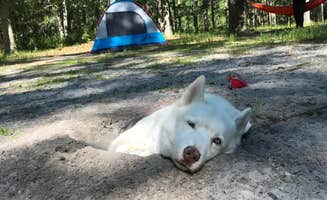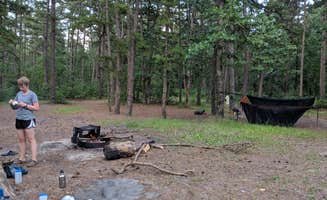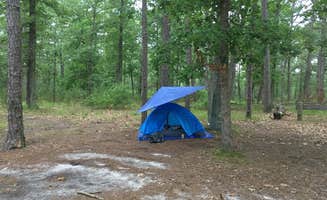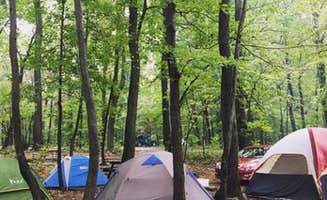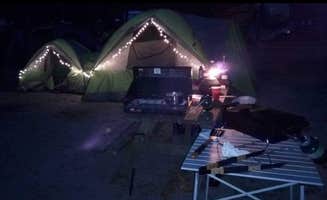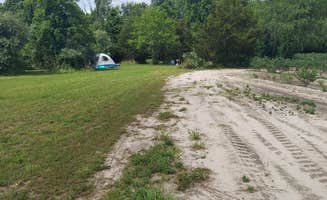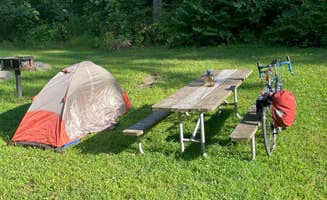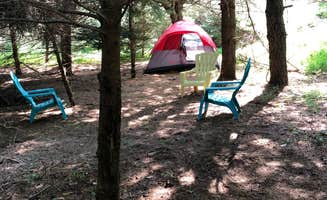Tent camping near Burlington, New Jersey offers experiences in the Pine Barrens region with its distinctive sandy soil and pine forest ecosystem. The area sits at low elevation with mostly flat terrain, making it accessible for campers of varying skill levels. Summer temperatures typically reach 85-95°F with high humidity, while spring and fall bring more moderate conditions with temperature ranges of 50-75°F.
What to do
Hiking on established trails: At Wharton State Forest Batona Campground, trailheads begin directly from campsites. "Trails vary in length but all are flat and easily accessible," notes Meghan G. The Batona Trail runs through the campground, connecting to miles of pine forest paths.
Bird watching opportunities: Fort Washington State Park features observation decks for spotting migratory birds. "From this very spot you can view the beautiful raptors that migrate here on a seasonal basis in both the Spring and Autumn," according to Stuart K. Species include Dark-eyed Juncos, Cooper's Hawks, and even Bald Eagles.
Paddling excursions: Round Valley State Park Campground offers access to a 2,350-acre reservoir. Ryan M. describes it as "Beautiful and quaint...a nice place to get away and enjoy some nature." Kayakers and canoeists can access campsites directly from the water, with T K. noting "really nice spot to camp very peaceful and quit. Gorgeous sunset, beautiful views."
What campers like
Private wooded sites: Tip Tam Camping Resort provides tent sites with natural surroundings. "Wooded sites. Owner Darren is great. Like family. Big sites," writes Tracy. The campground maintains a balance between amenities and natural setting.
Quiet evening atmosphere: Campers appreciate the tranquility at many Burlington area campgrounds. At Washington Crossing State Park, Wayne S. mentions it's "secluded and right on the Delaware River. Very enjoyable." Enforced quiet hours help maintain peace, though this varies by location.
Accessible recreation: Family-friendly activities within walking distance of tent sites. Dave B. from Tip Tam notes, "There are a lot of activities within the campground as well that were impressive. Just from walking around I saw the two pools, an RC track, bocci, shuffle and board."
What you should know
No-alcohol policies: Several state parks near Burlington enforce strict no-alcohol rules. At Evansburg State Park Campground, regulations clearly prohibit alcohol consumption. Check each campground's specific rules before packing supplies.
Variable bathroom facilities: Toilet facilities range from modern to primitive. At Mullica River campground, Rebecca S. warns about pit toilets: "There is a pit toilet, but did not check its status." Many primitive sites have minimal facilities, requiring campers to plan accordingly.
Seasonal availability: Most campgrounds operate from April through October. William W. notes about Mullica River, "The campground is open, it was closed because of covid in 2020." Always verify current operating schedules before planning a trip.
Tick presence: Ticks remain prevalent throughout regional campgrounds. Rebecca S. cautions, "NOTE: There are LOADS of ticks in this area." Appropriate clothing and regular tick checks are essential when tent camping near Burlington.
Tips for camping with families
Kid-friendly amenities: Alverthorpe Private Park offers numerous recreational options. Stuart K. notes it "packs a lot of entertainment options," including "baseball field, basketball court, fishing, football field, grills, lake, mini-golf, pavilions and shelters, kid's playground."
Short hiking distances: For families with young children, select campgrounds with brief trail options. Andrew C. from Evansburg shares, "Since he was 2 years old I've taken my son, and we always have an amazing time, either hiking the trails to wandering in the woods looking for 'adventures'."
Swimming options: Several campgrounds offer water recreation. At Tip Tam, Jenn M. reports "The place was fun.. they have peddle cars and playgrounds," though notes "there are no trees. It feels like you're camping out in a field with mostly sand around."
Tips from RVers
Access limitations: Most primitive tent sites near Burlington cannot accommodate RVs. At Goshen Pond Campground, Elliott B. explains, "I like campgrounds which have you park off and walk in to your site. There is more foot traffic, but you don't hear as many cars coming and going."
Sandy road conditions: Access roads to many Pine Barrens campgrounds have sandy surfaces. At Batona Campground, one reviewer notes, "The road into the campground is about 1 mile of loose sand. It can be accessed by a standard vehicle." RVs with low clearance may face challenges.
Size restrictions: Campgrounds with RV access often limit size. Stuart K. mentions "this is not a spot for RVs or 5th Wheelers" when describing access at certain parks. Check specific site measurements before booking for larger vehicles.


